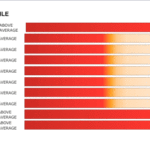Shiftwork is the work we have to do to manage, thrive and survive in a world where shift happens. I’ve identified 11 shifts that we have to make (see here), so far I’ve addressed the first four, and in this post, I address the fifth shift. The earlier ones you can read by following these links:
Shift 5 is from Risk as Failure to Risk as Endeavour.
Career Development tends to be focussed on career “success” and rarely is failure mentioned, written about or researched. This tends to create an atmosphere where success is seen as something to be desired and achieved above all else. Generally this is accompanied by the obverse message that failure is to be avoided, minimised, despised or feared. It is summed up in that popular motivational injunction that “Failure is not an option”.
Characterising failure in such resolutely negative terms is actually quite odd, given that we are surrounded and immersed in failures almost all of the time. Most predictions such as economic ones, or pretty much all others in fact, usually fail (at least to some degree). Most restaurants fail, most businesses fail, most people are rejected during an application or promotion process. Most of us fail to win the lottery or the raffle, our favourite players or teams fail to win every game, our favoured political parties fail to win government about half of the time (or a lot more!), our favourite films fail to win the Oscar, and so it goes.
Seeing failure only in terms of the risk it poses to our beloved pursuit of success is actually a very self-limiting perspective. For one thing it immediately rules out the possibility that failure may actually contribute significantly or even be the major reason for later success. It also rules out the possibility that valuable learning occurs when failure is appropriately reflected upon.
In a forthcoming paper (Pryor & Bright, 2011) we have identified 4 benefits of failure. These are:
- An Opportunity to Learn
- Encouraging Creativity
- Builds Strategy
- Personal/Spiritual Development
Opportunity to Learn
Put simply, Learning requires trial and error. Without the error, we never learn. It seems odd to say it, but we learn less from success that success and failure combined. For instance suppose there was a machine that delivered gold coins if you put yellow tokens into it, but gave you nothing if you put blue tokens into it. If you had 10 yellow tokens in your possession, you’d get 10 gold pieces and might conclude that putting tokens into the machine resulted in gold coins. However if you had 10 yellow and 10 blue tokens you’d learn more, that not only do you have to put a token in, but it needs to be yellow. You’ve learned more.
Failing early on in a process before too much time or effort is expended, maximises the time and resources left to leverage the learning that has taken place. Aim to fail well and early for more rapid success.
Encouraging Creativity
The way to have a good idea is to have lots of ideas. This general principle seems to be widely accepted in discussions of creativity. It practice it means establishing the conditions where people are encouraged to generate as many ideas as possible without paying attention to their value. It is thought that such brainstorming type approaches is like panning for gold, you sift a lot of rock to get the gold. In career development, as a general rule, the more strategies you try to land the job or promotion, the greater the likelihood of achieving this.
Builds Strategy
Once we accept that we might fail, it is easier to move forward and implement a strategy. By following Eleanor Roosevelt’s advice “that nothing will be achieved if first all objections must be overcome”, we can explore possibilities, despite the fact we might fail. If fear of failure is very strong, then we do not endeavour, and by so doing, we ultimately fail anyway in most circumstances.
Failing also helps to reveal the hidden contingencies in a situation that allows us to revise and improve our assumptions or models.
Personal / Spiritual Development
Failure is a great advertisement for our limitations to fully control, predict and know the world. Not all failures can be sheeted home to a lack of effort, support or planning. Some “failures” are simply beyond our control. For instance when we fail to get a job, it doesn’t always mean we made a mistake, rather it could simply be that there was an outstanding candidate up against us on this occasion. We can be the safest of drivers, yet still get injured when another driver loses control, or a large animal jumps out in front of us.
Such a perspective allows us to appreciate the limits of our power and knowledge, and indeed of what is controllable and knowable. It can help us toward a greater degree of humility.
Risk, Endeavour and Chaos Theory of Careers
The case for the Shift from Risk as Failure to Risk as Endeavour, rests on the fact that we live in a highly complex and interconnected world where we simply cannot work out in advance all of the possible contingencies, and therefore cannot plan, prepare or control for every outcome, or even imagine every possible outcome. This is the Chaos Theory of Careers (Pryor & Bright, 2011) perspective, and for this reason, failure needs to be seen as both inevitable but also desirable.
References
Pryor, RGL & Bright, JEH (2011). The Chaos Theory of Careers. Routledge. UK & USA.
Pryor, RGL & Bright, JEH (in press). There’s no success like failure and failure is no success at all”: The value of failing in career development. International Journal for Educational and Vocational Guidance.
Related Posts









Pingback: Transform your Career by Shifting: Shift 7 From Goals, Roles And Routines To Meaning, Mattering, And Black Swans | The Factory
Pingback: Transform your career by shifting: Shift 9: From Normative Thinking To Normative And Scalable Thinking | The Factory
Pingback: Transform your career by shifting: Shift 10 - From Knowing In Advance To Living With Emergence | The Factory
Pingback: Transform your career by shifting: Shift 11 - From Trust As Control To Trust As Faith | The Factory
Pingback: Transform your Career by Shifting: Shift 6 From Probabilities To Probable Possibilities | The Factory
Pingback: Transform your career by SHIFTING: Shift 8: From Informing To Informing And Transforming | The Factory